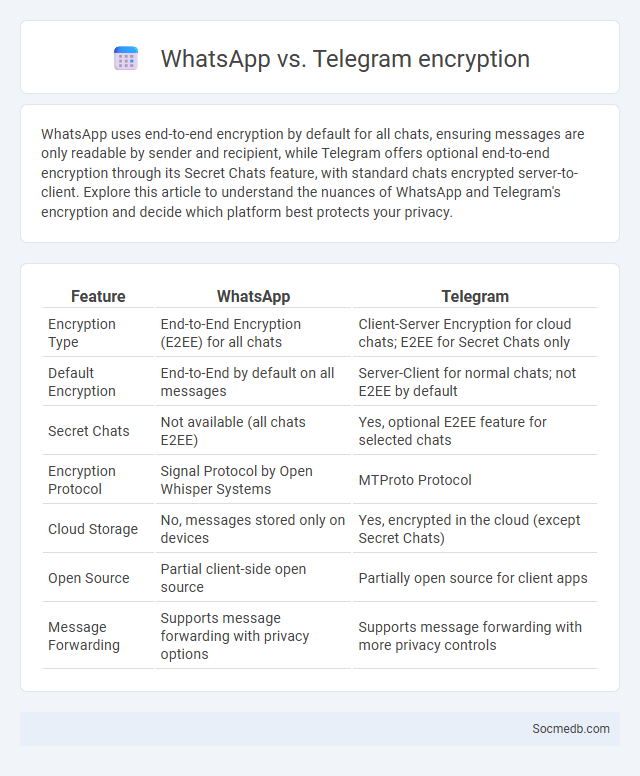
Photo illustration: WhatsApp vs Telegram encryption
WhatsApp uses end-to-end encryption by default for all chats, ensuring messages are only readable by sender and recipient, while Telegram offers optional end-to-end encryption through its Secret Chats feature, with standard chats encrypted server-to-client. Explore this article to understand the nuances of WhatsApp and Telegram's encryption and decide which platform best protects your privacy.
Table of Comparison
| Feature | Telegram | |
|---|---|---|
| Encryption Type | End-to-End Encryption (E2EE) for all chats | Client-Server Encryption for cloud chats; E2EE for Secret Chats only |
| Default Encryption | End-to-End by default on all messages | Server-Client for normal chats; not E2EE by default |
| Secret Chats | Not available (all chats E2EE) | Yes, optional E2EE feature for selected chats |
| Encryption Protocol | Signal Protocol by Open Whisper Systems | MTProto Protocol |
| Cloud Storage | No, messages stored only on devices | Yes, encrypted in the cloud (except Secret Chats) |
| Open Source | Partial client-side open source | Partially open source for client apps |
| Message Forwarding | Supports message forwarding with privacy options | Supports message forwarding with more privacy controls |
Introduction to Messaging App Encryption
Messaging app encryption secures conversations by converting messages into coded formats only readable by intended recipients, protecting user privacy from cyber threats. End-to-end encryption (E2EE) is a prevalent method in platforms like WhatsApp, Signal, and Telegram, ensuring that even service providers cannot access message content. This technology is essential for safeguarding sensitive communications against interception and unauthorized access on social media networks.
Understanding End-to-End Encryption
End-to-end encryption ensures that only you and the intended recipient can access the content of your messages, protecting your data from hackers and unauthorized parties. This security protocol encrypts messages on your device and decrypts them only on the recipient's device, making it impossible for social media platforms or third parties to read your conversations. Understanding this technology is crucial for maintaining privacy in an increasingly connected digital landscape.
How WhatsApp Implements End-to-End Encryption
WhatsApp employs end-to-end encryption by using the Signal Protocol, ensuring that messages are encrypted on your device and can only be decrypted by the recipient's device. This encryption covers texts, calls, photos, videos, and voice messages, preventing anyone, including WhatsApp itself, from accessing the content. Your privacy remains protected as encryption keys are stored exclusively on user devices, making interception or unauthorized access virtually impossible.
Telegram’s Approach to Encryption
Telegram employs end-to-end encryption in its Secret Chats, ensuring that only you and the recipient can access the messages, providing maximum privacy and security. Its MTProto protocol combines high-speed data transfer with robust encryption algorithms to protect user data from interception. With features like self-destructing messages and encrypted voice calls, Telegram prioritizes safeguarding personal communication against unauthorized access.
Comparing Default Security Settings
Default security settings on popular social media platforms vary significantly in their ability to protect Your personal information and online interactions. Facebook emphasizes privacy controls with options to limit profile visibility and restrict friend requests, while Twitter's default settings allow public tweets, which can expose Your posts to a wider audience. Instagram enables private accounts by default, enhancing security, but users must actively manage settings to prevent unwanted access and maintain control over their content.
Encryption Protocols: WhatsApp vs Telegram
WhatsApp uses the Signal Protocol for end-to-end encryption, ensuring messages and calls are secure by default for all users, making it one of the most trusted platforms for private communication. Telegram offers client-server/server-client encryption for standard chats and end-to-end encryption only in its Secret Chats feature, meaning regular chats are encrypted on the cloud and accessible from multiple devices. The fundamental difference lies in WhatsApp's default full encryption versus Telegram's selective encryption approach, impacting user privacy and data security strategies on these platforms.
Message Privacy: Key Differences
Message privacy on social media platforms varies significantly based on encryption methods, data storage policies, and user control options. End-to-end encryption ensures that only you and the recipient can read messages, while platforms without this feature may store and potentially share your data with third parties. Understanding these key differences helps safeguard your personal information and maintain confidentiality in your digital communications.
Vulnerabilities and Security Concerns
Social media platforms expose users to vulnerabilities such as data breaches, identity theft, and phishing attacks due to the vast amount of personal information shared online. Cybercriminals exploit weak privacy settings and insecure passwords to gain unauthorized access, compromising your sensitive data and online reputation. Implementing strong security measures and regularly updating privacy controls are essential to protect your digital presence from evolving threats.
User Control Over Encryption Options
User control over encryption options on social media platforms enhances privacy by allowing individuals to select end-to-end encryption for their messages and data. Customizable encryption settings empower users to determine who can access their content, reducing unauthorized surveillance and data breaches. Platforms offering intuitive encryption controls support safer communication, fostering trust and compliance with global data protection regulations.
Which Messaging App Offers Better Privacy?
Signal offers superior privacy features through end-to-end encryption, open-source protocols, and minimal data retention, making it a preferred choice for secure communication. WhatsApp also uses end-to-end encryption but collects more metadata, raising concerns about user privacy. Telegram provides encrypted chats but defaults to cloud storage, which is less secure compared to Signal's encrypted messaging framework.
 socmedb.com
socmedb.com